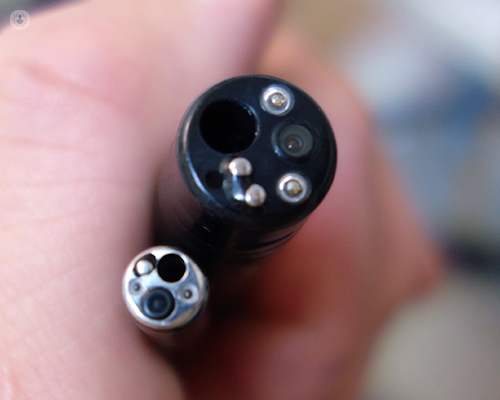The endoscopic revolution
Written by:The small bowel is an 8 m long, floppy tube, which makes managing problems challenging. However, new endoscopic techniques are changing this. Top gastroenterologist Dr Edward John Despott, a specialist in double balloon enteroscopy, is here to explain:

What are endoscopic procedures?
Endoscopy is a technique used by doctors to examine the inside of the body, particularly the digestive system. A long, thin tube called an endoscope, with a camera and a light source attached, is passed into the patient’s body via the mouth, the anus, or through an incision made by the surgeon, depending on the part of the digestive tract that needs to be examined. Endoscopes may be used simply to view the patient’s digestive tract, or to take biopsies or even perform minimally invasive procedures using attachments on the endoscope.
New endoscopic options
Until recently, the only endoscopic options available for small bowel disease included the intrinsically limited ‘push’ enteroscopy, which only allows examination of the first metre of the bowel, and the significantly invasive intra-operative enteroscopy (IOE), which carries the risks of major surgery. In recent years, the development of wireless small bowel capsule endoscopy (SBCE) and double-balloon enteroscopy (DBE) have revolutionised endoscopic investigation and management of small bowel disease by facilitating visualisation of the entire SB without the need for surgery.
These two procedures are complementary. SBCE has a diagnostic role, limited to capturing images. It is used as an image ‘scout’ to guide DBE, which in turn offers tissue biopsy as well as therapeutic options.
Double balloon enteroscopy
DBE overcomes the challenges of the small bowel’s anatomy by employing a 200cm long enteroscope, 2 balloons and a 145 cm stabilising plastic overtube. The balloons inflate and deflate in an alternating pattern, folding the intestine wall around the overtube in a ‘push-and-pull’ manoeuvre to allow the enteroscope to pass deep into the digestive tract. It can be inserted orally or rectally, facilitating complete enteroscopy. A minimally invasive alternative to IOE, it allows surgeons administer endotherapy, such as argon plasma coagulation (APC), clipping and injection therapy of vascular lesions, dilatation of strictures, polypectomy and direct percutaneous endoscopic jejunostomy (DPEJ) placement for enteral nutrition.
What are the risks of double balloon enteroscopy?
DBE is a safe and effective procedure (with overall complication rates of <1%); in appropriate cases, the endotherapy it offers has also been shown to avoid the need for operative surgery.
It is nonetheless a complex, advanced endoscopic procedure which requires years of dedicated training to be performed effectively and is only available in a handful of specialist centres in the UK and currently only three NHS centres and only one private centre in London (The Royal Free Private Patients Unit). The Royal Free DBE service is currently the most advanced and busiest DBE service in the UK with its lead clinicians (who underwent dedicated training in DBE in Japan) having over 11 years of experience in the performance of this complex procedure.
Visit Dr Edward John Despott’s Top Doctors profile to book an appointment with him today.


